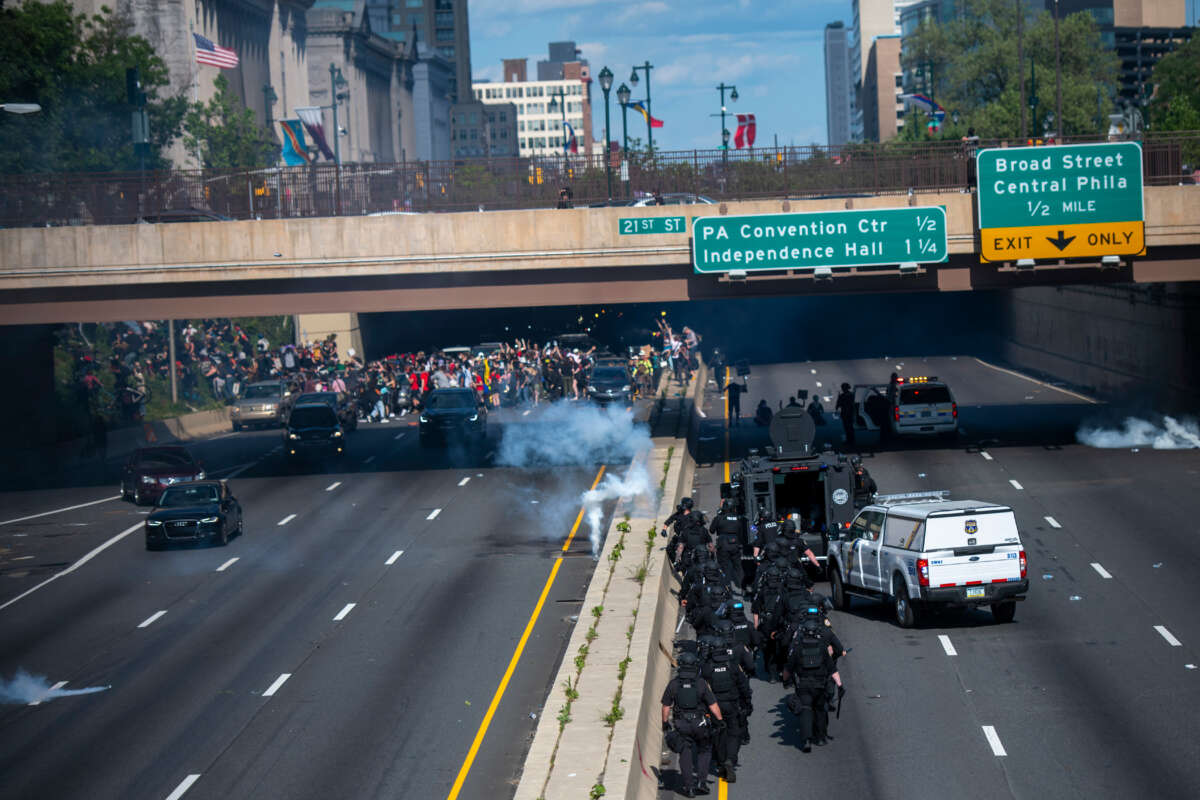The city of Philadelphia announced on Monday that it will be paying out nearly $10 million to protesters and a community fund to settle a lawsuit brought by demonstrators who were brutalized by police as they rose up in opposition to that same violence in the summer of 2020.
Philadelphia has agreed to pay $9.25 million to the roughly 350 protesters who brought suits against the city. It will also pay up to $600,000 to the Bread & Roses Community Fund, a social justice-focused nonprofit, which will fund free mental health counseling in a predominantly Black neighborhood in West Philadelphia.
As part of the settlement, the city also affirmed that it has ended its involvement with a federal program that funnels U.S. military equipment to local police departments, known as the 1033 program.
Attorneys for the plaintiffs and the plaintiffs themselves celebrated the settlement while acknowledging the city must continue to be held accountable for its violence against protesters and the police must be held accountable for their brutality at large.
“Instead of protecting us, the Philadelphia Police Department waged war in our streets, tear gassed us, and shot us with rubber bullets,” said Amelia Carter, a plaintiff. “There should be no place for the militarization of a police department that is supposed to serve us.”
The lawsuits were focused on two back-to-back incidents on May 31, 2020, and June 1, 2020. In May, police went to 52nd Street in West Philadelphia, where police shot protesters with tear gas and rubber bullets across the residential neighborhood. The tear gas — an agent of war and abortifacient that can cause severe irritation to the skin, eyes, lungs and throat — blanketed the street, leaking into homes and terrorizing protesters and bystanders alike.
“Today’s monetary compensation is an important step, but it does not represent full accountability for the harm that occurred,” said Shahidah Mubarak-Hadi, a plaintiff in one of the four cases, in a statement. “Police fired tear gas at our family’s home, leaving my three-year-old son crying and my six-year-old son completely terrified. The house was enclosed in gas, and we were trapped inside with nowhere to go. The city still has not given us a simple apology, and it must properly acknowledge this egregious act before true healing can begin.”
On June 1, 2020, police SWAT teams trapped protesters on the side of Interstate 676 just minutes after they had gathered, firing tear gas indiscriminately at demonstrators and rendering many in the crowd unable to breathe, protesters said.
One plaintiff who was on I-676, Jo Dean, told the Philadelphia Inquirer that just before the tear gas hit, “I remember thinking during that time that if anything was going to change, this would be it. And it didn’t.” Of the settlement, Dean said, “I would give up all the money if the police could simply agree to do no harm.”
George Floyd protesters in other cities have received similar settlements. Earlier this month, New York City agreed to pay at least $21,500 each to about 320 demonstrators who say they were arrested, detained or the victims of police violence during the protests. Minneapolis also reached a $600,000 settlement in November with 12 protesters who say they were subjected to the same chemical and physical weaponry used on those who protested police-perpetrated murders across the country in 2020.
Join us in defending the truth before it’s too late
The future of independent journalism is uncertain, and the consequences of losing it are too grave to ignore. To ensure Truthout remains safe, strong, and free, we need to raise $24,000 by the end of today. Every dollar raised goes directly toward the costs of producing news you can trust.
Please give what you can — because by supporting us with a tax-deductible donation, you’re not just preserving a source of news, you’re helping to safeguard what’s left of our democracy.
